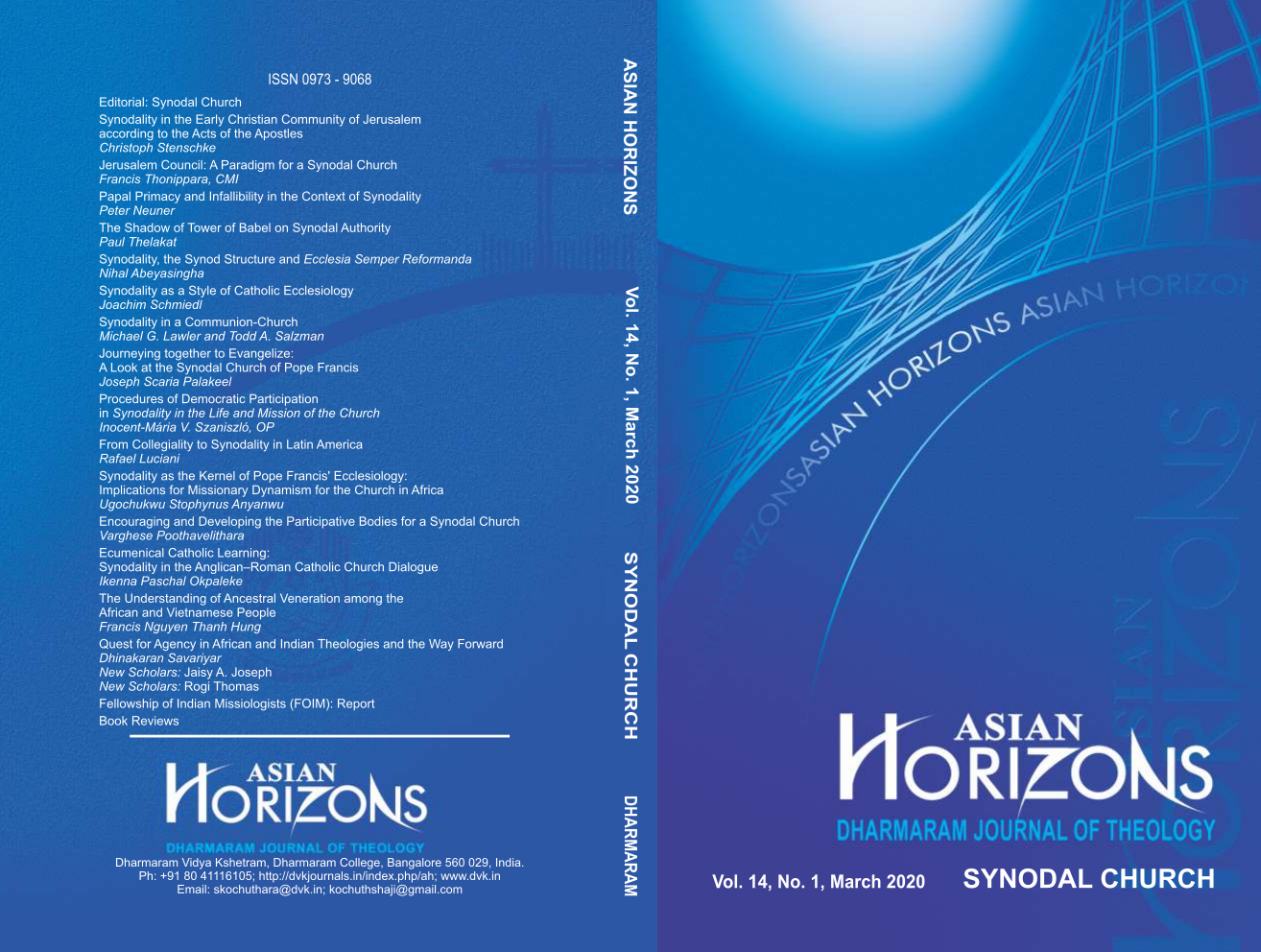Procedures of Democratic Participation in Synodality in the Life and Mission of the Church
Keywords:
Church as a Way of Dialogue, Polis Area with the Church, Social Doctrine of the Catholic Church, Social Diakonia, Solidarity, Structures of Democratic Participation, Synodal ChurchAbstract
International Theological Commission (ITC) published in 2018 a document entitled Synodality in the Life and Mission of the Church, which, in accordance with the ideas of Pope Francis on the occasion of the 50th anniversary of the Institution of the Synod of Bishops, develops the ancient idea of a synodal understanding of the Church as a way of dialogue, solidarity and social diakonia. The document notes the practice of dialogue and the search for effective joint solutions by which we commit ourselves to peace and justice like an absolute priority in a situation where there is a structural crisis in the procedures of democratic participation and a loss of confidence in its principles and inspirational values, with the threat of authoritarian and technocratic aberrations. For this reason, in our paper, we would like to address these procedures by looking for a place of the Church in the social life with a help of several important Catholic thinkers.
References
Benedikt Thomas Viviano OP, Notes d´un bibliste pour une future théologie de la démocratie, Manuskript in personal Archive, 1.
Hannah Arendt, Essai sur la révolution, Paris: Gallimard, 1967.
International Theological Commission, Synodality in the Life and Mission of the Church, http://www.vatican.va/roman_curia/congregations/cfaith/cti_ documents/rc_cti_20180302_sinodalita_en.html.
Jean-Pascal Perrenx, “Les sources de la théologie morale,” Revue Kephas 1 (January–March 2002) 37-48.
John L. McKenzie, Authority in the Church, Sheed and Ward Inc., 1966.
John L. McKenzie, Moc v Cirkvi (Prešov: M. Vaško, 2003).
John L. McKenzie, Wladza v Kosciele (Warszawa: Pax, 1972).
Josef Ratzinger, “Demokratisierung der Kirche?,” Demokratie in der Kirche: Möglichkeiten und Grenzen, ed. Josef Ratzinger, Hans Mayer, Limburg-Kevelaer: Lahn, 2005, 7-46.
Josef Ratzinger, “Znaczenie wartości religijnych i etycznych w spoleczeństwie pluralysticznym,” in Naród-Wolnośc-Liberalizm, Red. L. Balter, Kolekja Communio, n°9, Poznań: Pallotinum, 1994.
Joseph Kardinal Ratzinger, “Europa—verpflichtendes Erbe für die Christen Kirche, in Kirche, Ökumene und Politik, Einsiedeln: Johannes, 11987, 198-210.
Karl Gabriel, “Machtausübung in der heutigen Kirche im Spiegel sozialwissenschaftlicher Machttheorien: Max Weber, Michel Foucault und Hannah Arendt,” Concilium 3 (1988) 190-195.
Paul Valadier, “Quelle démocratie dans l´Église ?,” La morale sort de l´ombre, Paris: Desclée de brouwer, 2008.
Paul VI, Ecclesiam Suam, http://www.vatican.va/content/paul-vi/en/ encyclicals/documents/hf_p-vi_enc_06081964_ecclesiam.html (accessed on January 1, 2020).
Radiomessaggio di Sua Santità Pio XII ai Popoli Del Mondo Intero (Radio message of His Holiness Pope Pius XII to Peoples of the whole World), https://www.vatican.va/content/pius-xii/it/speeches/1944/documents/hf_p-xii_spe_19441224_natale.html (accessed August 1 2019).
Robert Mager, Le politique dans l’Eglise: Essaie ecclésiologique à partir de la théorie politique de Hannah Arendt, Montréal: Médiaspaul, 1994.
Roos Lothar, Entstehung und Entfaltung der modernen Katholischen Soziallehre, in Rauscher Anton, ed., Handbuch der Katholischen Soziallehre, Berlin: Duncker&Humbolt, 2008, 104-142.
Vatican II, Lumen Gentium, http://www.vatican.va/archive/hist_ councils/ii_vatican_council/documents/vat-ii_const_19641121_lumen-gentium_en. html (accessed January 1, 2020).
W. Piwowarski, “Dyktatura,” in Slownik katolickiej nauki spolecznej, Warszawa: IW Pax, 1993.
Wladyslaw Blin, “Demokratie oder Diktatur,” Lecture at 24th Summer academy 2010 of KMB (Catholic Men’s Action) Austria in Bad Tatzmansdorf, http://www.kmb.or.at/

